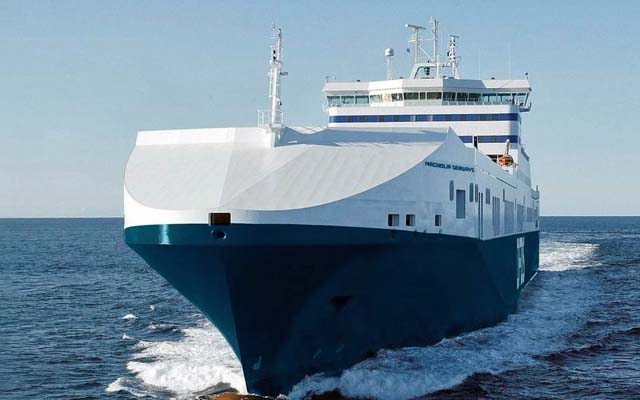During the past year, H2 Energy and DFDS have worked together on a project to analyse the feasibility of retrofitting large ferries with a hydrogen propulsion system.
Now, the project has been finalised, contributing important knowledge for further analysis on the use of hydrogen as an alternative fuel for sea transport. The project was supported by the Danish Maritime Fund.
The transition to green fuels brings challenges for the shipping industry and is highly dependent on cross sector collaboration, technological improvements, and research and innovation. Green Hydrogen can be produced with water and renewable energy only and because of its high energy content, it is considered a potentially significant fuel source for ships and society in general.
Under the DFDS ‘Vessels of tomorrow’ programme, two methanol, two electric and two ammonia vessels are planned to be added to the company’s fleet over the next six years. Although hydrogen is not included in the programme and DFDS is not planning to use hydrogen as fuel in the immediate future, DFDS will continue to contribute to the development of knowledge on hydrogen as part of the company’s ongoing analysis of possible net-zero scenarios for both vessels and road transport.
With support from the Danish Maritime Fund, DFDS, H2 Energy and LLoyd’s Register (LR) set out to uncover the technical and operational feasibility of hydrogen propulsion systems by analysing the main aspects of a complete hydrogen ecosystem using the DFDS ro-ro vessel Magnolia Seaways on the Esbjerg-Immingham-Esbjerg route as the focal point of the study. This includes sourcing of green hydrogen from H2 Energy’s large scale production facility in Esbjerg, on-shore supply and logistics, including bunkering, application of a hydrogen-fuelled powertrain, and safety measures. The LR Maritime Decarbonisation Hub contributed to the study with a safety risk assessment and issued Approval in Principle (AiP) for the concept and the initial design of the hydrogen systems.
The study concluded that retrofitting Magnolia Seaways with a hydrogen fuelled propulsion system is technically feasible and commercially viable under a set of basic assumptions. However, building the entire hydrogen ecosystem to produce hydrogen cost-effectively and at scale is complex. Everything from energy infrastructure and policy support must be in place.
Rolf Huber, Founder H2 Energy said: “Hydrogen holds great potential for the decarbonisation of the logistics sector, both at sea and on land. Our new study is only one part of a larger puzzle that involves both energy providers, ports, government authorities and end users such as shipping companies and so on. This project adds further knowledge about hydrogen and its potential for decarbonisation. It is a great starting point for the further development of hydrogen ecosystems to enable large scale application of hydrogen fuel in the future.” H2 Energy is involved in several projects to establish hydrogen production, including one of the world’s largest facilities in Esbjerg. The company has previously helped develop solutions to convert trucks and heavy transport from diesel to hydrogen.
DFDS has ambitions to reach a 45% reduction in TtW CO2 intensity from ferries and 75% reduction in WtW GHG intensity from road transport, terminals and warehousing by 2030. By 2050 the target is to achieve net zero. To reach these targets, DFDS is looking into all possible options.
Mads Bentzen Billesø, DFDS Head of Innovation and Partnerships said: “We are following several pathways to pursue our net zero targets. Hydrogen shows promise, and it is one of the fuels we are analysing as a potential fuel source in the future, both on land and at sea. We are collaborating closely with partners, suppliers and other stakeholders to address and solve known challenges associated with using zero-emission fuels. We need to build knowledge about the different options to make smart decisions, and it is important that we share this knowledge. And I want to extend my thanks to the Danish Maritime Fund for their important contribution to this project which I am sure will benefit the entire industry.”
The global energy transition drives a move from fossil fuels to alternative energy sources, which inevitably brings about new safety challenges and the need for shipping to manage more complex hazards. The LR Maritime Decarbonisation Hub uses various techniques to assess these hazards and determine how the risks can be reduced.
Nick Brown, LR Group CEO added: “Supply chain projects, where forward-looking stakeholders collaborate, are critical to building on the strong knowledge and ambition that exists within the maritime sector on energy transition opportunities. As we move to novel fuels such as hydrogen, a risk-based approach is required, to demonstrate to all stakeholders that the risks are mitigated to an acceptable level. The knowledge gained from this project involving the Lloyd’s Register Maritime Decarbonisation Hub and other industry initiatives will further enhance safety and accelerate the pace with which we can effect change.”
The full report is publicly available and can be downloaded here.
Image: ‘Magnolia Seaways’ ro-ro (source: DFDS)



